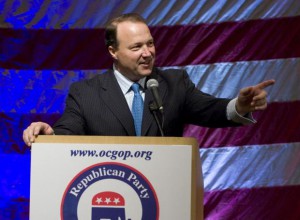By Former Assembly Republican Leader and former Orange County Republican Party Chairman Scott Baugh
The firing of James Comey unleashed a flurry of comparisons to the Saturday Night Massacre when President Nixon ordered the firing of special prosecutor Archibald Cox, who was investigating the Watergate scandal. The comparisons are misguided.
In 1973, President Nixon ordered his then Attorney General, Elliot Richardson, to fire Archibald Cox who issued a subpoena for the famed Nixon tapes. Richardson refused the President’s order and resigned. Nixon then ordered the Deputy Attorney General, Williams Ruckelshaus to fire Cox. Ruckelshaus refused and likewise resigned. Eventually, Nixon found somebody in the person of Solicitor General Robert Bork to obey his order and Bork fired Cox.
The injustice to Cox was that he was fired for doing his job. Comey was fired for not doing his job.
Mr. Comey’s investigation of Secretary Clinton’s email scandal received bi-partisan praise, until he announced on July 5, 2016, that there would be no prosecution of Secretary Clinton. While he trashed Secretary Clinton for her conduct and extreme carelessness, he concluded there was insufficient evidence to convict her of a crime.
Many were dumbfounded with his conclusions, but most experts of the Justice Department were more dumbfounded at his behavior, i.e., it was not his place to decide whether there would be a prosecution because he was not the prosecutor. And, it was not his place to trash the subject of the investigation. Acting politically, he tried to please both sides and succeeded only in angering both sides.
As Comey’s boss, the Attorney General, Jeff Sessions, conducted an investigation of Comey’s behavior. Citing bi-partisan commentary from other Attorney Generals from the previous 5 administrations, the investigation revealed that Comey violated numerous protocols at the FBI.
Moreover, unlike the firing of Cox, the firing of Comey did not originate with the President. Cox’s immediate boss at the Justice Department, Richardson and then Ruckelshaus both defended Cox and refused to fire him because he was doing his job. In contrast, Comey’s immediate boss at the Justice Department recommended that Comey be fired for not doing his job.
Noteworthy, Cox was a special prosecutor who had authority to prosecute or decline to prosecute President Nixon. In contrast, Comey had no such authority. As the Director of the FBI, Comey only had authority to conduct an investigation and then make recommendations to the Justice Department prosecutors. Comey’s mistake was that he played politics by making decisions above his pay grade because he lacked confidence in those above his pay grade.
Playing politics with the nation’s most sensitive criminal investigation during a presidential election is overtly arrogant, and an indication that Comey saw himself as being above the rules or the sole arbiter of right and wrong.
Worse yet, by politicizing his conclusions and violating FBI protocol, many in his rank and file lost confidence in him. Instead of owning his original mistake, he sought to regain confidence in his leadership by announcing on October 28, 2016, that he was reopening the investigation due to emails that landed in Anthony Wiener’s laptop. He closed that investigation on November 6, 2016, just two days before the election. Secretary Clinton and her supporters will forever believe that this 10-day “window of doubt” cost her the election.
President Trump likewise found Comey to be a two-edged sword. Apart from his yo-yo opening, closing, opening and closing Secretary Clinton’s email investigation, Comey has come under fire for his handling of the alleged Russian involvement in the presidential election.
On March 20, 2017, Comey dropped a bombshell on Congress when he testified that the FBI has been investigating possible coordination between the Trump campaign and Russia. Was he trying to make up for negatively impacting Clinton’s campaign?
The reason this is plausible is that the FBI’s source of the possible Russian ties was Christopher Steele, who was working as a private investigator for one of Trump’s opponents. Let that previous sentence sink in a bit. Mr. Steele was offered $50,000 from the FBI if he could corroborate his allegations. He could not but the FBI launched its entire investigation on this dubious and partisan source who was nothing more than a political hack hired by a Trump opponent.
Now, let’s compare the FBI’s investigation of Russian ties with Nixon’s Watergate scandal. The Nixon investigation was littered with an originating crime (burglary), cover-ups, and actual evidence of obstruction of justice, including discussions of perjury, blackmail and paying off the burglars with a million dollars.
In contrast, the FBI’s current investigation of the Russian connection doesn’t even have a hint that a crime was committed by anybody associated with the campaign.
The only saving grace for Comey in this matter is that he confirmed that the former Director of National Intelligence, James Clapper, was right to say that there was no evidence of collusion between Russia and Donald Trump. Yet the noise and investigation continues. The two-edged Comey sword strikes again.
Comey’s termination was long overdue. Of course, the timing is fair game in political commentary, especially because Trump has alternated between praise and criticism of Comey, and because the Clinton matter is several months old. But, under the chain of command, the Director of the FBI reports to the Deputy Attorney General, who was just confirmed by the Senate on April 26 by a margin of 94-6.
Regardless, let’s all get real with the facts in comparing this to the Saturday Night Massacre, where there was an attempt to squelch objective evidence of crimes committed and active cover-ups being plotted.
Moreover, with Comey there was widespread press criticism of his behavior and bi-partisan calls for his termination. Archibald Cox had only one critic – President Nixon.
Scott Baugh is a former Assembly Republican Leader and former Orange County Republican Party Chairman.


